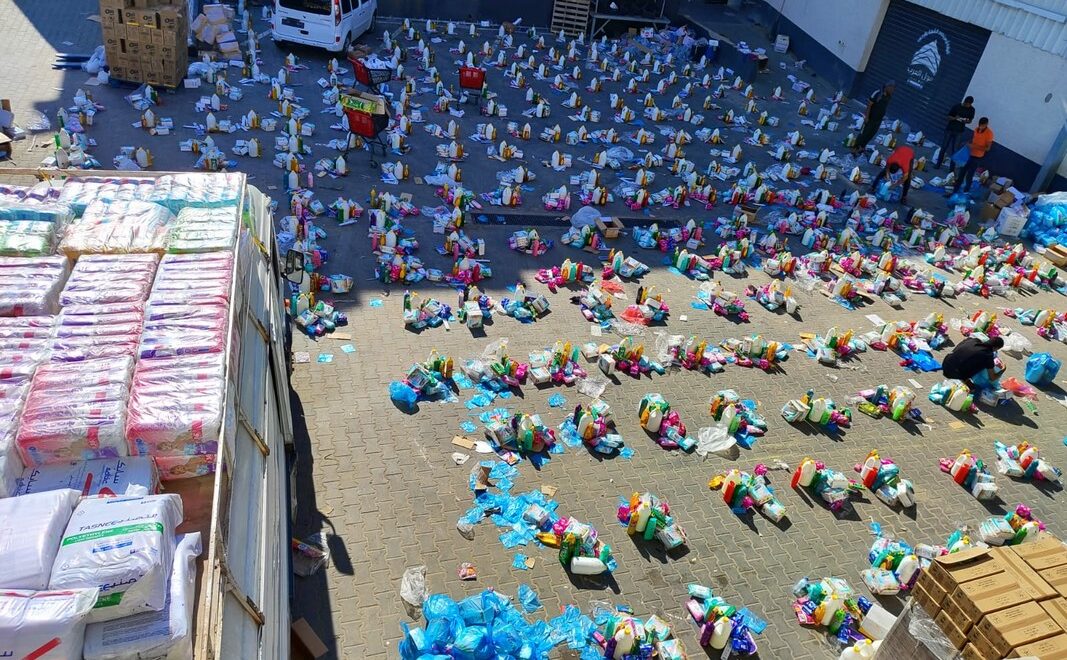Desperation is increasing by the day among the hunger-stricken population of northern Gaza, which has been almost entirely cut off from aid in the 100+ days since the war began. People are now so hungry that they are combing the floor for wild grass to cook, while some have started slaughtering and eating horses as staggeringly high prices at the market mean they can’t even afford to buy animal feed to eat. The deputy executive director of the World Food Programme has warned that famine is imminent in northern Gaza if food aid is not urgently delivered.
Dawud*, who lives in the north of Gaza, said:
“The situation is very tragic. There are no necessities for life, no flour, no rice, no vegetables, nothing. The big problem is that it is difficult to explain to children that there is no food, no water to drink, nothing…
People started thinking about eating animals. They finished eating animal fodder and now they started eating animals. Yesterday I heard news that some people slaughtered a horse and ate it. People are unable to provide any food for their family. People have begun to wish for death. There are children who have died of hunger.”
Gaza is currently seeing the worst level of child malnutrition anywhere in the world. One in six children in the north of Gaza are currently acutely malnourished, while 3% of these are suffering from severe wasting – the most serious kind of malnutrition. A recent UNICEF survey found that legumes, fruits, and vegetables, as well as meat and dairy products, had almost completely disappeared from their daily diets. It also found that 95% of pregnant or breastfeeding women in the north had eaten two or less food groups the previous day, with most relying on only grains or eggs, leaving them critically undernourished.
Taaliah* is a 22-year-old pregnant woman in northern Gaza. She said:
“Five months of my pregnancy were spent living the horrors of the war. I did not have enough food or water which resulted in me waking up dizzy every day. I barely had any meals, and almost had no access to nutritious fruits or vegetables. The financial situation is really bad here; there is nothing available.
I went to see a doctor in Al-Awda Hospital. There, I was informed of the [health issues] that both my baby and I had. I was also told that my baby needed medication and vitamins due to the lack of nutrition. Unfortunately, medicine is not available in pharmacies or anywhere else. My due date is one week from now. I am searching for the medicine, as I fear for my baby’s life and health.”
Tragically, as people’s health deteriorates due to the lack of food, accessing medical support is becoming even harder. Today ActionAid learned that the hospital run by our partner, Al-Awda – one of the last remaining partially functioning medical facilities in the north of Gaza – has been forced to suspend its services due to lack of fuel and supplies.
Earlier this week, Dr Adnan Radi, a doctor at Al Awda Hospital, shared with us in a voice note:
“Frankly and without any exaggeration, the people here are suffering from [absolute] real hunger. Everything [is] missing from the markets. Sometime ago, I used to go to the market and find some tinned goods: a can of beans or a can of chickpeas. Now everything related to food is missing. Unfortunately, a bag of flour costs 3,000 shekels ($834.68) and it’s not available.
Children and women, everyone suffers from hunger. We do not eat anything, and when the hospital tries as much as possible to provide [something, it will be] only half a plate of boiled rice with hot water, not more. But otherwise, there is no food. As for vegetables, there is nothing except for cheese-weed [a perennial herb], which grows in the wild. People began to run between agricultural lands to search for plants such as cheese-weed, or purslane… any grasses on the ground, and they cook them…People are cooking animal fodder. It has reached the stage of kneading [dough from] animal fodder, which has also reached astronomical prices. If humanitarian organizations do not intervene urgently…you will find people and children dying in the streets.”
Yet even as people starve, food supplies are being stopped from entering Gaza and reaching those who need it. The amount of aid allowed into Gaza in February was half of that which entered in January, according to the head of UNRWA, despite the recent ruling from the International Court of Justice which stated that humanitarian assistance must be increased. According to Human Rights Watch, the daily average number of aid trucks entering Gaza has dropped by 30% since the court’s ruling.
Virtually no food aid at all has reached the north of Gaza in weeks. The Israeli military has prevented many aid missions to the north from taking place: more than half of the missions planned in January were denied access, according to UNOCHA. And last week, the World Food Program suspended its aid deliveries to the north altogether due to safety reasons, amid reports of aid convoys coming under fire.
Riham Jafari, Advocacy and Communications Coordinator at ActionAid Palestine, said:
“Gaza’s entire 2.2 million population is now facing high levels of acute food insecurity, according to projections – the highest share of people ever recorded worldwide. The situation is unprecedented and utterly terrifying. With most of the food production system in Gaza – from bakery mills to fishing boats, cropland to greenhouses – either damaged or destroyed, every single person in the territory is reliant on food aid, yet the amount getting into Gaza is wholly insignificant compared to what is needed. Meanwhile desperate people in the north are currently not receiving any aid at all and babies are reported to be dying from starvation.
The situation could not be more urgent. For months, multiple organisations have been sounding the alarm that famine is on the way in Gaza – now it’s on the doorstep. It’s still possible to stop this crisis escalating any further but it will require mass unfettered access for humanitarian aid and an immediate and permanent ceasefire so that aid can be delivered safely. As the death toll from Israel’s military campaign approaches the appalling figure of 30,000, we know for certain that even more men, women and children will die as a result of hunger and malnutrition unless urgent efforts to stop this food crisis in its tracks are made.”
ENDS
For media requests, please email Jenna.Farineau@actionaid.org or call 202-731-9593.
Spokespeople are available:
- Niranjali Amerasinghe, Executive Director of ActionAid USA
- Riham Jafari, Coordinator of Advocacy and Communication for ActionAid Palestine
About ActionAid
ActionAid is a global federation working with more than 41 million people living in more than 71 of the world’s poorest countries. We want to see a just, fair, and sustainable world, in which everybody enjoys the right to a life of dignity, and freedom from poverty and oppression. We work to achieve social justice and gender equality and to eradicate poverty.


